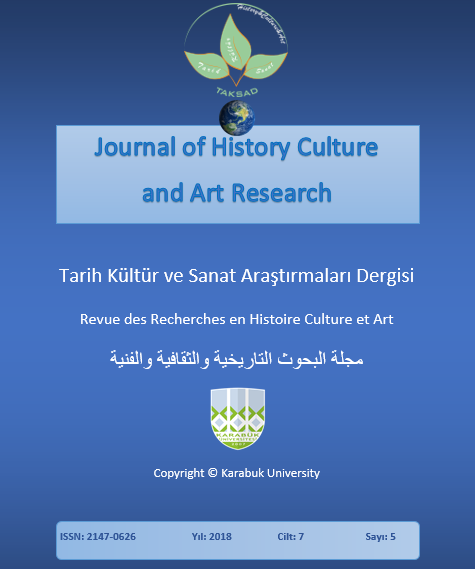Review of Turkish-Israeli Relations Based on Neo-Realism
DOI:
https://doi.org/10.7596/taksad.v7i5.1313Keywords:
Westernization, Islam, Neo-realism, Turkey, Israel.Abstract
Basically, the two countries, Turkey and Israel, apart from their relations with Iran, are the important and influential countries in the region and the global developments associated with the Middle East, so efforts to better understand the two countries help to answer the questions about these two countries. This research, along with the historic genealogy of Turkey-Israel relations has attempted to address the roots of Turkey-Israel Westernization and its relation with the proximity of the two countries and the formation of strategic cooperation between Ankara and Tel Aviv. Our important issue in this study is to examine the relation between Turkey and Israel from a historical point of view, based on the neo-realism approach in the field of foreign policy.
References
Afzali, Rasoul & Hosseini, Majid (2008). The Study of Geopolitical Developments in Turkey and Its Effect on Iran. Tehran, Geopolitics Quarterly, No. 1, Spring, 151-176.
Aykan, Mahmut Bali (1996). Turkish perspectives on Turkish-US relations concerning Persian Gulf security in the post-cold war era: 1989-1995. Middle East Journal, 50(3). 344-358.
Blshku, Michael B. (2006). How has Turkey viewed Israel? Israel Affairs, 12(1), 177-194. DOI: https://doi.org/10.1080/13537120500382099
Chegini Zadeh, Gholamali & Khosandam, Behzad (2010). Interaction and opposition of peripherality and Westernization in Turkish foreign policy. Tehran, Strategic Quarterly, 55, Summer, 189-220.
Daheshyar, Hossein (2012). Pakistani Turkey. Tehran, Economic Political Information, 288, 32-41.
Eligür, Banu (2012). Crises in Turkish- Israeli relations (December 2008 - June 2011): from partnership to enmity. Middle Eastern studies, 48(3), 429-459. DOI: https://doi.org/10.1080/00263206.2012.662893
Eskandari, Majid (2010). A Study of the Objectives and Fields of the Formation of Turkey's Alliance and Zionist Regime in the Nineties and Subsequent Developments. Tehran, Defense Policy Magazine, 72, Autumn, 227-265.
Fuller, Graham E. & Lesser, Ian O. (1993). Turkey’s New Geopolitics: from the Balkans to Western China. Oxford: Westview Press.
Inbar, Efraim (2008). Israel's Security. Defense Strategy Quarterly, 6(2), 85-105.
Ja'fari, Ali Akbar (2007). Neorealism Theory and Strategic Alliance between Israel and America. Tehran, Research Journal of Political Science and Law, 2(6), 105-135.
Lochery, Neill (1998). Israel and Turkey: deepening ties and strategic implications, 1995-98. Israel affairs, 5(1), 45-62.
Marom, Dror (1996). Irvy Signs Israel- Turkey Defense Co-operation Agreement. Israel Business Arena, August.
Pollat, Borhan (2008). Turkey and the Zionist Regime: Past, Present and Future, translated by Elias Vahidi, Cultural Institute for International Studies and Studies of Abrar Moaser, March, pp. 57-98.
Uzer, Umut (2011). Türkiye-İsrail İlişkilerinde Bunalım. Ortadoğu Etütleri, 2(2), 137-168.
Weisi, Morad (n.d.). The Sixth War of Arabs and Israel. Tehran, Kheili Door Kheili Nazdik Journal, 90-94.
Yilmaz, Selman (2013). State, politics, and religion: effects of political and social change on the relationship between state and religion in Turkey, 2002-2012. Dissertation. Department of sociology. University of Pittsburgh.
Yilmaz, Selman (2014). Social mobility and its discontents: the center-periphery cleavage of Turkey. Journal of history culture and art research, 3(2), 28-44. DOI: http://dx.doi.org/ 10.7596/taksad.v3i2.356
Downloads
Published
How to Cite
Issue
Section
License
All papers licensed under Creative Commons 4.0 CC-BY.- Share — copy and redistribute the material in any medium or format
- Adapt — remix, transform, and build upon the material for any purpose, even commercially.
Under the following terms:
Attribution — You must give appropriate credit, provide a link to the license, and indicate if changes were made. You may do so in any reasonable manner, but not in any way that suggests the licensor endorses you or your use.
- No additional restrictions — You may not apply legal terms or technological measures that legally restrict others from doing anything the license permits.







